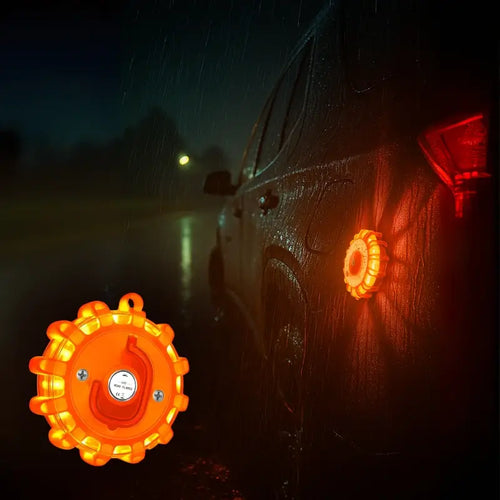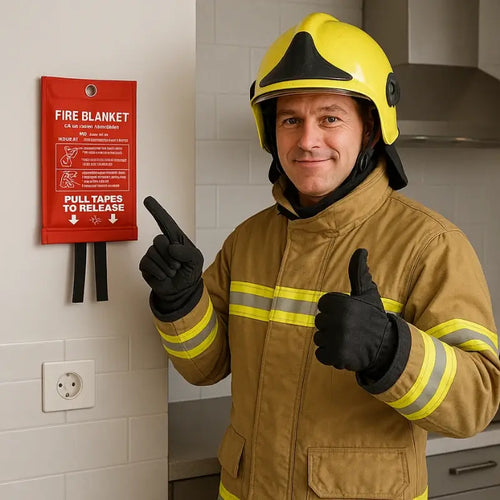House fires happen much more often than you might think - and usually when you least expect it. According to the National Fire Protection Association (NFPA), the fire department in the UK is called out to a fire every 21 seconds. With so many call-outs, it's even more important to take precautions in good time. Even if you can't predict when a fire will start, there are things you can do to reduce the risk.
Here are three simple steps you can take to make your home much safer.

1. keep combustibles away from heat sources
One of the simplest and most effective ways to prevent fires is to never place flammable items near sources of heat - i.e. stoves, fan heaters or candles. Everyday items such as paper, plastic or fabrics can ignite in a flash. Even a tea towel, newspaper or cleaning cloth will catch fire immediately if they are too close to something hot.
If you consistently separate heat sources and flammable items, the risk of fire is greatly reduced. In the kitchen and garage in particular, you should regularly take a quick look to make sure everything is clear and there is no dangerous clutter. Just a few seconds of attention a day can make a big difference.
Typical fire traps that you should watch out for:
-
Paper: newspapers, magazines, kitchen rolls
-
Fabric: towels, tea towels, curtains, bed linen
-
Plastic: containers, bags, packaging
-
Wood: furniture, decoration, firewood
-
Lint: In the dryer or on air vents
-
Oils: cooking oil or engine oil
-
Spray cans: hairspray, cleaning agents
Make it a habit to keep such things at least one meter away from heat sources. For example: never leave kitchen roll, cloths or wooden spoons directly next to the stove. Utensils and ingredients accumulate quickly in the kitchen - keep the surfaces free of paper or plastic anyway.
For even more safety, it is worth using a fire blanket or a grease fire extinguisher (fire class F).

2. keep cooking areas clear
The kitchen is the number one fire hotspot - mainly because of grease and other flammable substances. A very simple trick: keep your cooking surface free of clutter. In a clean, tidy kitchen, you can concentrate fully on cooking and reduce the risk of accidents enormously.
Imagine you leave cooking utensils, packaging or cleaning products right next to the stove - all it takes is a small spark and it burns to the ground. Grease fires (fire class F) are particularly dangerous and can be made even worse by water. Therefore: Keep everything unnecessary away from the stove.
Fire hazards due to disorder:
- Unattended cooking: The main cause of kitchen fires. Clutter distracts you - and you overlook the pan.
- Rapid spread: A small flame immediately spreads to other things lying around.
Just make it a routine: tidy up briefly before and after cooking. Put away everything you don't need and keep the work surface clear. This way you always have a complete overview and recognize dangers in good time.
And very important: never leave the kitchen unattended while cooking - not even for a few minutes.

3. check electrical appliances regularly
Many fires are caused by faulty appliances, damaged cables or overloaded sockets. You should therefore check your electrical appliances regularly to make sure that everything is working properly.
How to avoid electrical fires:
- Unplug appliances when you are not using them - especially those that generate heat (e.g. toasters or fan heaters).
- Watch out for wear and tear: frayed cables or appliances that get too hot.
- Check sockets: they should be neither damaged nor discolored.
Old or defective pipes in particular are a risk - and fires behind them often go unnoticed for a long time. Regular inspections help to detect dangers early and take countermeasures in good time.
How to recognize defective devices:
- Unusual noises: Your device is making strange noises - beware!
- Fuse constantly blows: Often a sign of a defect or overload.
- Overheating: If an appliance gets hot, something is wrong.
- Smell of burning: If it smells scorched, switch off immediately and check.
As soon as you notice anything, act immediately! Repairs should always be carried out by specialists - tinkering around yourself can be life-threatening. A small check log is also practical: this way you always know when which appliance was last checked.
Conclusion
Fire protection at home doesn't have to be complicated. If you keep flammable items away, keep the kitchen free of clutter and check your electrical appliances regularly, you will reduce the risk enormously.
Remember: fire protection means taking precautions in good time. Small, everyday actions make a big difference in protecting you and your family. It's best to start today - stay safe, hero!








